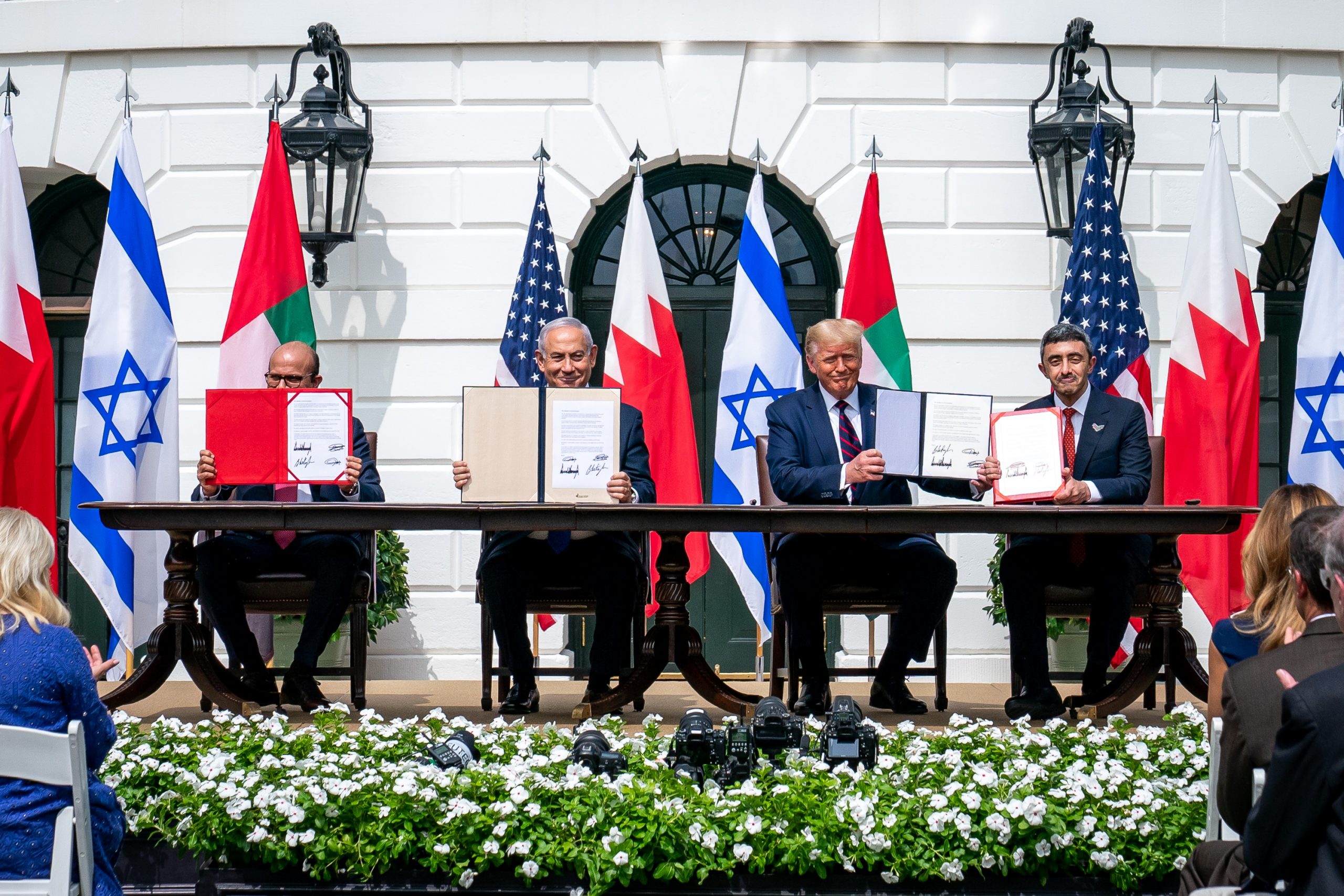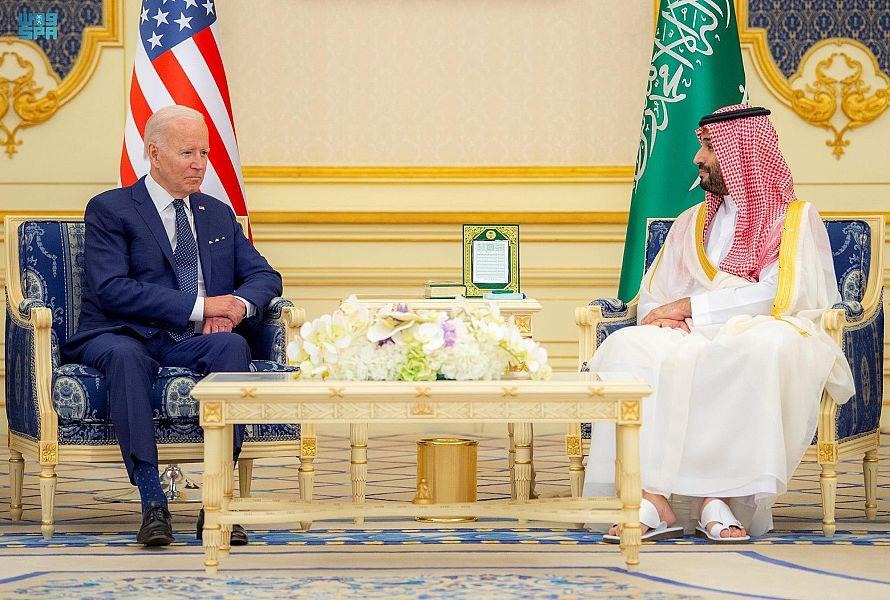Publications
INSS Insight No. 1633, August 15, 2022
In recent years a significant change, however slow and gradual, is apparent in Saudi Arabia regarding ties with Israel. While there are signs of possible compromises on its part regarding its connection with Israel, it is estimated that a possible improvement of relations would follow a different model than the Abraham Accords. Saudi Arabia chose ties with Israel as a strategic option, but in its view full normalization is expected only with progress in resolving the Palestinian issue. Any attempt to urge the kingdom to improve its relations with Israel in the immediate term, and certainly to make the existing relations public, could undermine the prospects for success. At this stage, Riyadh remaining backstage on the normalization issue, while helping warm Israel’s relations with Arab and Muslim countries behind the scenes, is actually the preferred option.
President Biden's visit to Israel and Saudi Arabia in July 2022 again placed the issue of normalization of relations between the two countries on the agenda. As early as 2020 it was apparent that Riyadh was pursuing a kind of "creeping normalization" to prepare the ground for the process, which would culminate with increasing openness regarding Israel. Since then, the United States administration has changed, negotiations have resumed between the United States and Iran on returning to the nuclear agreement, a different government rules in Israel, and the relations between it and central countries in the region have deepened as part of the Abraham Accords – developments that might affect Saudi Arabia's position on relations with Israel.

Especially since Mohammed bin Salman assumed his role as Crown Prince, a slow and gradual change has been evident in the kingdom regarding the question of relations with Israel, and there are signs of possible compromises on the issue. Inter alia, there have been reports of increased involvement by the Israeli private sector in technology and agriculture deals in the kingdom, and even several meetings between Israeli and Saudi defense figures to strengthen intelligence-operational cooperation and arms sales between the countries. However, in order to make the relations public and to enable their expansion, the Saudi royal house will have to overcome both internal and external sensitivities that are related in part to the unique nature of the kingdom and impact its standing, especially as “custodian of the holy places of Islam,” and even its stability. Saudi Arabia supported the Abraham Accords "from the outside" and its leaders, chiefly the Crown Prince, are expressing themselves in a more moderate way than in the past toward Israel. Nonetheless, several issues preserve barriers to substantive change in Riyadh's position on normalization.
- Relations with the United States: Strengthening relations with the United States is a supreme Saudi interest that is also related to bin Salman's domestic standing. In recent years there have been doubts among the Saudi elite regarding the United States' willingness to stand by its side at times when Saudi interests are threatened, especially by Iran. The Saudis may be sheltering possible compromises vis-à-vis Israel as compensation for a change in attitude toward the kingdom on Washington's part that would include, inter alia, guarantees vis-à-vis Iran and turning over a new leaf with bin Salman, who is expected to consolidate the legitimacy of his rule. Therefore, it remains to be seen whether the understandings reached between the United States and Saudi Arabia during President Biden's visit to the kingdom are realized. The main message that Biden sought to convey at the GCC+3 summit held during his visit to Saudi Arabia was that the United States is returning and taking upon itself a leadership role and even regional mediation, at the expense of China and Russia, which in recent years have worked to strengthen their foothold in the region. This message was met with skepticism on the part of the Arab regimes, which are not convinced that Washington has internalized their strategic hardships, especially regarding Iran, and that it is willing to invest in protecting their interests. In their view, the message that Biden conveyed reflects an immediate American interest – the need to moderate the price of oil. Still, the Saudis sought to reset their relations with the United States, while increasing military cooperation and receiving American guarantees in the Iranian context, as a condition for their cooperation in restraining China's efforts to expand its presence in the region. Israel for its part has an interest in a pro-American Arab orientation, as relations between the Arab countries and Washington directly affect their ability/willingness to move forward with normalization with Israel.

- The Palestinian issue. In March 2022, bin Salman said that Israel is not seen as an enemy, but as a potential ally, and first it will have to resolve the problems with the Palestinians. On the other hand, his father, King Salman, holds the more traditional position on Israel and the conflict, and ties normalization with Israel to the parameters of the Arab Peace Initiative. On the eve of Biden's visit to the kingdom, Adel al-Jubeir, Minister of State for Foreign Affairs, emphasized the Saudi leadership's commitment to implementing the Arab Peace Initiative and to the establishment of a Palestinian state whose capital is East Jerusalem: "We clarified that peace comes at the end of the process, not at its beginning." This position also leaves the kingdom with leeway for slow, small-scale normalization measures, before fully resolving the Palestinian issue. Riyadh will probably want to see, certainly as a condition for official relations with Israel, at least the beginning of Israeli-Palestinian dialogue – certainly as a condition for measured rapprochement with Israel. It is possible that the differences heard in the messages express a desire to maintain leeway, with bin Salman's statements aimed more at American public opinion. In any case, the probability of normalization with Israel will likely grow after the death of Salman, and at the same time it is estimated that bin Salman's position will be influenced by his understanding of the implications of rapprochement with Israel for the internal legitimacy of his succession.
- Internal change necessary. Aside from internal politics in Saudi Arabia, the question arises to what extent Saudi society, which is mostly conservative, is open to normalization with Israel. In the past few years, aside from certain criticism, Saudi society has been able to accommodate significant social and economic change processes. However, it does not necessarily follow that publicizing relations with Israel, and certainly signing a normalization agreement with it, would receive such support, especially among Salafi streams, which still have significant standing. While recently a more tolerant discourse has been evident toward other religions, intended to examine the street's response and to instill messages of coexistence in the public discourse, this effort has encountered criticism, although mainly from Saudi exiles, mostly opponents of the regime, not from citizens fearful of openly expressing opinions opposed to those of the royal house. Public opinion has remained mostly against normalization with Israel: according to recent public opinion polls, about 80 percent of the kingdom's citizens oppose the Abraham Accords, although there is a certain openness to business relations with Israel by individuals. In any case, the assessment is that to the extent that bin Salman feels that he is able to control the public discourse, he will have increased confidence in taking steps toward rapprochement with Israel.
- Standing in the Muslim world. This issue is a vital interest for Saudi Arabia, which could be harmed by criticism on the part of those such as Iran that seek to appropriate the Palestinian issue and to castigate Saudi Arabia for how it uses it. Improving the kingdom's relations with Qatar and Turkey could moderate external criticism of improving its relations with Israel; due to the kingdom's weight in the Muslim world, an agreement with it would grant "religious validation" to relations with Israel and probably even enable Israel to improve its relations with the entire Muslim world.
- Iran. Over the years the threat posed by Iran to the region's countries has been a basis for quiet rapprochement between Israel and Saudi Arabia, even though Israel emphasizes the nuclear threat while Saudi Arabia sees Iran as a power striving for regional hegemony and emphasizes Iran's missiles and unmanned aerial vehicles and its proxies as the current supreme threat. Relations with Israel carry advantages for the kingdom: coordination on the political-strategic level regarding shared challenges; and thwarting of threats on the intelligence-operative level, including access to Israeli technology that is relevant for anti-missile defense. While a connection with Israel could reinforce Saudi Arabia's image of deterrence against Iran, among the Gulf states there is a fear of being seen as serving as a kind of "forward base" for Israel. Saudi Arabia, which maintains an ongoing dialogue with Iran, is no exception in this regard.

It seems that Saudi Arabia will continue to gradually prepare the ground for greater openness in relations with Israel, even if under a different model than that of the Abraham Accords, both in the depth of the openness and in the pace of change. In accordance with Saudi policy, during President Biden's visit to the Middle East, the Saudi aviation authority announced that subject to the Chicago Convention on International Civil Aviation of 1944, it will now also allow Israeli aircraft to fly through its airspace. The announcement was phrased in an obscure manner and presented as a national-economic need for improving the kingdom's air connectivity as a hub, and in effect it expanded the existing permit for Israeli aircraft to fly through Saudi airspace to the United Arab Emirates and Bahrain. However, Saudi Arabia's Deputy Ambassador to the UN, Mohammed al-Ateeq, emphasized in a Security Council discussion on the Palestinian issue that enabling Israeli aircraft to fly through the kingdom's airspace is not a step in the direction of normalization. Another step that some see as connected to normalization is the Saudi-American agreement on the departure of the Multinational Force and Observers in Sinai (MFO) from the islands of Tiran and Sanafir (which Egypt returned to Saudi sovereignty in 2017) and the stationing of a surveillance system that will replace the force and continue to ensure freedom of navigation in the Straits of Tiran.
The conclusion drawn from the process so far that led to the Abraham Accords is that given suitable incentive and pressure, the Gulf countries could take steps that deviate from the Arab consensus and from their positions on the Palestinian issue. Therefore, it is possible that Riyadh will advance its relations with Israel regardless of progress on the Israeli-Palestinian channel but rather in relation to compensation that it will receive from the United States. And indeed, relations between Washington and Riyadh, and even more so American attention and American leadership of normalization in the Middle East, are of decisive importance. If the Saudi leadership estimates that rapprochement with Israel will help it strengthen its relations with the United States, improve the extreme image that has adhered to it, and earn economic and political dividends, it could take another step toward Israel.
The continuation and expansion of the existing normalization agreements are important to the connection between Jerusalem and Saudi Arabia, in part because they are meant to grant legitimacy to their subsequent expansion. However, staying backstage while helping to improve Israel's relations with Arab and Muslim countries is actually preferable to Riyadh at this stage. A push to advance and highlight the relations and certainly making them an internal Israeli political issue, as occurred surrounding President Biden's visit to the Middle East, will create unrealistic expectations, increase pressure on the Saudis, and undermine the process. Even though Saudi Arabia has been going through not insignificant social-cultural changes in recent years, the question of its relations with Israel remains connected to its standing and even its stability. Therefore, at the present time, a full normalization agreement is seen in the kingdom as a step too far too soon.



